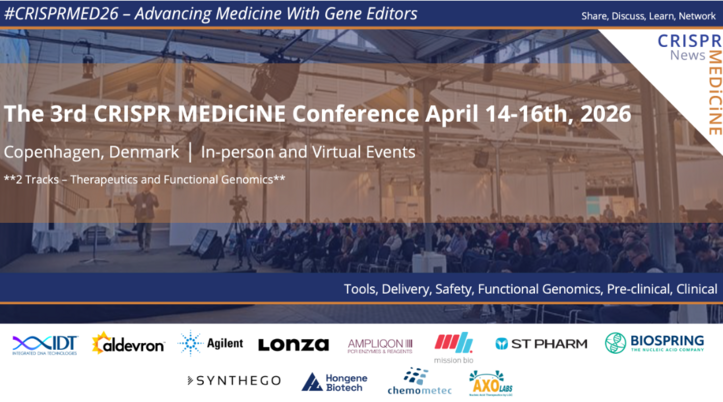The Latest Updates From the Gene-Editing Clinical Trials (July 2024)
Beam Therapeutics doses first patient with BEAM-302 in alpha-1 antitrypsin deficiency trial
Beam Therapeutics announced in recent weeks that it has dosed the first patient with BEAM-302 in a Phase 1/2 clinical trial.
BEAM-302 is a base-editing therapeutic candidate designed to address the underlying cause of alpha-1 antitrypsin deficiency (AATD), an inherited disease characterised by deficiency in the alpha-1 antitrypsin enzyme (AAT).
In healthy individuals, AAT functions as an anti-protease by inhibiting the activity of neutrophil elastase. Neutrophil elastase is secreted by white blood cells as a normal part of the immune response during infection, but if not tightly controlled by AAT it can attack healthy tissues. Individuals with pathogenic mutations in the SERPINA1 gene - which encodes AAT - are at increased risk of developing lung and liver disease.
Alpha-1 antitrypsin deficiency (AATD)
AATD is a genetic condition that increases the risk of developing severe lung and liver disease, including emphysema (lung), cancer, and organ failure. Several types of mutations in the SERPINA1 gene can cause AATD. These mutations can either reduce the quantity of AAT produced by the liver, completely inhibit the production of AAT, or alter the structure of the AAT protein, preventing its release from the liver, thereby failing to protect the lungs and leading to the accumulation of abnormal AAT in the liver, causing hepatic damage over time. Most individuals living with severe AATD are homozygous for the PiZ mutation, which is known as p.Glu366Lys (and also referred to as E342K).
AATD affects approximately 1 in 1,500 to 3,500 individuals with European ancestry, while 100,000 individuals are estimated to be homozygous for PiZ in the United States alone. The disease is incurable and current treatment approaches predominantly aim to control symptoms and reduce risk factors. Augmentation therapy, a lifelong treatment involving the administration of AAT protein derived from donor blood, can increase AAT levels in the lungs and slow lung damage, though it does not prevent liver damage. Lung and liver transplants may be an option for patients with severe disease, although donor organs are not easy to obtain and the surgeries are not without complications.
In vivo base editing therapy to correct PiZ mutation
BEAM-302 is an in vivo liver-targeting base-editing therapy designed to precisely correct the PiZ mutation, a single point mutation found in the majority of severe homozygous patients living with AATD. Specifically, BEAM-302 is an adenine base editor designed to make a single A-to-G correction of the PiZ mutation. The candidate is delivered via lipid nanoparticles (LNP) and is expected to simultaneously reduce the buildup of mutated AAT in the liver as well as circulating mutant AAT, and increase the circulating levels of corrected, functional AAT.
Because BEAM-302 is designed to correct the PiZ mutation in its native location in the genome, it is anticipated to restore normal AAT function during infection, which does not occur with currently approved augmentation therapies.
BEAM-302 is being evaluated in an open-label, dose-escalation Phase 1/2 trial to evaluated safety, pharmacodynamics, pharmacokinetics and efficacy. The trial includes a dose exploration portion followed by a dose expansion portion to identify the optimal dose for a future pivotal study.
See the official press release here for further details.
Intellia Therapeutics shares first-ever redosing data for a gene-editing therapy
At this year's Peripheral Nerve Society Annual Meeting, Intellia Therapeutics presented new clinical data demonstrating for the first time the potential for redosing with an experimental in vivo CRISPR therapy. These data were collected from the ongoing Phase 1 study of NTLA-2001, a single-dose treatment in development for transthyretin (ATTR) amyloidosis.
NTLA-2001 is jointly developed by Intellia Therapeutics and Regeneron and was the first in vivo CRISPR therapy to be administered to humans via the bloodstream. It is designed to be a single-dose curative treatment for transthyretin amyloidosis by selectively reducing the levels of mutated TTR protein in the blood, through CRISPR-Cas9-based inactivation of the TTR gene in liver cells.
Data from the Phase 1 trial previously demonstrated that a one-time 55 mg dose of NTLA-2001 led to consistent, deep and durable reduction of serum TTR protein levels. This dose was selected for further evaluation in the actively enroling Phase 3 MAGNITUDE trial for ATTR with cardiomyopathy (ATTR-CM) and the planned Phase 3 trial for ATTR with polyneuropathy (ATTRv-PN).
The latest data reveal that follow-on dosing with the 55 mg dose of NTLA-2001 led to a 90% median reduction in serum TTR 28 days after treatment in the three patients who previously received the lowest dose in the Phase 1 dose-escalation study. The company reported that the 55 mg follow-on dose was well tolerated across all patients. While the company states in its press release that redosing is not planned for the NTLA-2001 programme in ATTR, a redosing option could be an important benefit of Intellia’s non-viral, LNP-based delivery platform for future investigational therapies where a target additive effect is desired.
Transthyretin amyloidosis (ATTR)
Transthyretin amyloidosis (ATTR) is a rare, progressive disease, in which a protein known as TTR becomes misfolded and accumulates as plaques in tissues throughout the body. This causes serious complications that mainly involve the heart and nerves, and most patients die 2-15 years after disease onset. ATTR occurs in a heritable form (ATTRv) and an acquired form (ATTRwt) that may occur with elevated age (ATTRwt). The exact prevalance of ATTR is unknown but ATTRv amyloidosis is estimated to affect 50,000 people worldwide.
Editas Medicine announces new clinical data from 18 patients treated with sickle cell disease therapeutic candidate
The new safety and efficacy data, presented at this year's European Hematology Association Congress, were collected from 18 patients treated with reni-cel during the Phase 1/2/3 RUBY clinical trial.
Reni-cel (formerly known as EDIT-301) is being developed as a one-time treatment for sickle cell disease (SCD) and the related disease beta thalassemia (BT). Reni-cel is an autologous (i.e. patient-derived) CRISPR-edited cell therapy candidate that works by reactivating foetal haemoglobin production, thereby compensating for the lack of functional adult haemoglobin in individuals with SCD and BT. The candidate is developed using a CRISPR-Cas12a ribonucleoprotein to enhance the HBG1/2 promoter region in the beta-globin locus of patient-derived haematopoietic stem cells. Naturally-occurring HbF-inducing mutations in this genomic region support the clinical relevance of enhancing the HBG1/2 promoter, and this strategy has been shown to increase the red blood cell levels of foetal haemoglobin.
According to a press release about the recent data, all patients treated in the RUBY trial are free of vaso-occlusive events following a single reni-cel infusion. It was also reported at treated patients experienced early normalisation of total haemoglobin with a mean within the normal range, as well as rapid and durable improvements in foetal haemoglobin. Editas Medicine further reported that reni-cel was well-tolerated and demonstrated a safety profile consistent with that of myeloablative conditioning and autologous haematopoietic stem cell transplantation.
See the official press release here for further details.
KSQ Therapeutics announces dosing of the first patient with its CRISPR-edited TIL therapy for cancer
KSQ Therapeutics has announced dosing of the first patient in a combined Phase 1/2 trial of KSQ-001EX, an experimental tumour-infiltrating lymphocyte (TIL) therapy developed for diverse solid tumours including melanoma, non-small cell lung cancer, and head and neck squamous cell carcinoma.
KSQ-001EX is developed using TILs in which the SOCS1 gene is inactivated via CRISPR-Cas9 gene editing. SOCS1 was selected as a therapeutic target for solid tumours following its identification through KSQ’s CRISPRomics® platform as a key gene inhibiting T cell growth, survival, and differentiation by negatively regulating cytokine signaling in the tumour microenvironment.
According to a press release, data from pre-clinical studies demonstrate the potential of KSQ-001EX as a novel and effective solid tumour treatment through enhanced anti-tumour activity, persistence, and memory formation.
The KSQ-001EX trial is an open-label, safety lead-in study for patients with melanoma, head and neck squamous cell carcinoma, and non-small cell lung cancer, with a primary Phase 1 objective to evaluate the safety and tolerability of the experimental therapy. In the safety lead-in portion, a cohort of patients will be initially dosed without IL-2 (which is used in cancer treatment to stimulate the patient's immune system). The primary objective of Phase 2 is to evaluate anti-tumour activity in indication-specific cohorts.
Find more details in the press release here.
Stay tuned for more updates
We will continue to update you on the gene-editing clinical trials as new details emerge. In the meantime, can find all of our coverage on clinical-stage gene editing programmes here.
For a complete overview of current gene editing clinical trials, check out CRISPR Medicine News' Clinical Trials Database.
**CRISPRMED25 - The 2nd CRISPR Medicine Conference, Copenhagen, Denmark, April 7-11, 2025**
Learn about the latest discoveries in CRISPR Medicine at the CRISPRMED25 Conference in Copenhagen, Denmark, April 7-11, 2025.
Tags
ArticleNewsClinical News UpdatesAlpha-1 Antitrypsin Deficiency, AATDSickle Cell Disease, SCDSolid TumoursTransthyretin amyloidosis, ATTRBeam Therapeutics Inc.Editas Medicine, Inc.Intellia Therapeutics, Inc.KSQ Therapeutics
CLINICAL TRIALS
Sponsors:
Suzhou Maximum Bio-tech Co., Ltd.
Sponsors:
Zhejiang University







